(完整版)联合国宪章英文版
- 格式:doc
- 大小:13.51 KB
- 文档页数:1
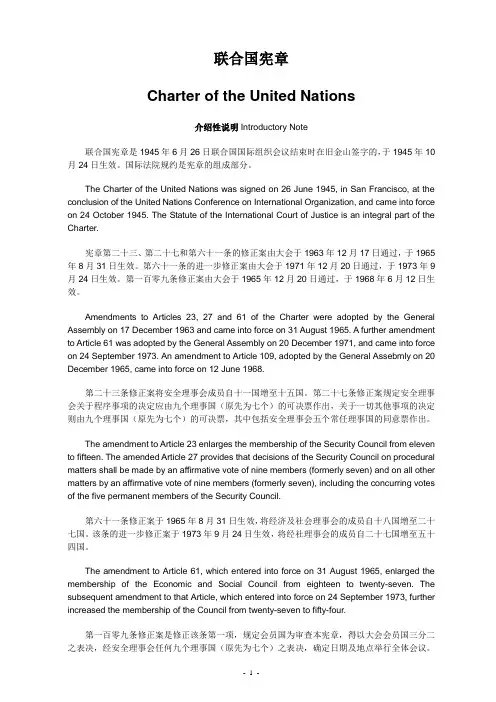
联合国宪章Charter of the United Nations介绍性说明Introductory Note联合国宪章是1945年6月26日联合国国际组织会议结束时在旧金山签字的,于1945年10月24日生效。
国际法院规约是宪章的组成部分。
The Charter of the United Nations was signed on 26 June 1945, in San Francisco, at the conclusion of the United Nations Conference on International Organization, and came into force on 24 October 1945. The Statute of the International Court of Justice is an integral part of the Charter.宪章第二十三、第二十七和第六十一条的修正案由大会于1963年12月17日通过,于1965年8月31日生效。
第六十一条的进一步修正案由大会于1971年12月20日通过,于1973年9月24日生效。
第一百零九条修正案由大会于1965年12月20日通过,于1968年6月12日生效。
Amendments to Articles 23, 27 and 61 of the Charter were adopted by the General Assembly on 17 December 1963 and came into force on 31 August 1965. A further amendment to Article 61 was adopted by the General Assembly on 20 December 1971, and came into force on 24 September 1973. An amendment to Article 109, adopted by the General Assebmly on 20 December 1965, came into force on 12 June 1968.第二十三条修正案将安全理事会成员自十一国增至十五国。
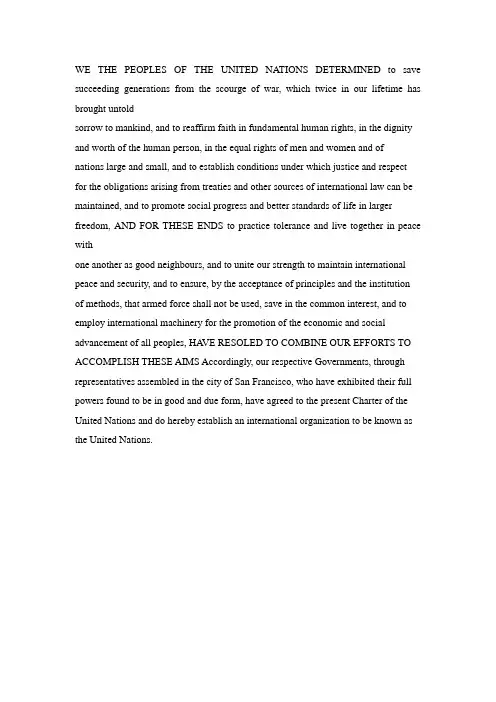
WE THE PEOPLES OF THE UNITED NATIONS DETERMINED to save succeeding generations from the scourge of war, which twice in our lifetime has brought untoldsorrow to mankind, and to reaffirm faith in fundamental human rights, in the dignity and worth of the human person, in the equal rights of men and women and of nations large and small, and to establish conditions under which justice and respect for the obligations arising from treaties and other sources of international law can be maintained, and to promote social progress and better standards of life in larger freedom, AND FOR THESE ENDS to practice tolerance and live together in peace withone another as good neighbours, and to unite our strength to maintain international peace and security, and to ensure, by the acceptance of principles and the institution of methods, that armed force shall not be used, save in the common interest, and to employ international machinery for the promotion of the economic and social advancement of all peoples, HA VE RESOLED TO COMBINE OUR EFFORTS TO ACCOMPLISH THESE AIMS Accordingly, our respective Governments, through representatives assembled in the city of San Francisco, who have exhibited their full powers found to be in good and due form, have agreed to the present Charter of the United Nations and do hereby establish an international organization to be known as the United Nations.。
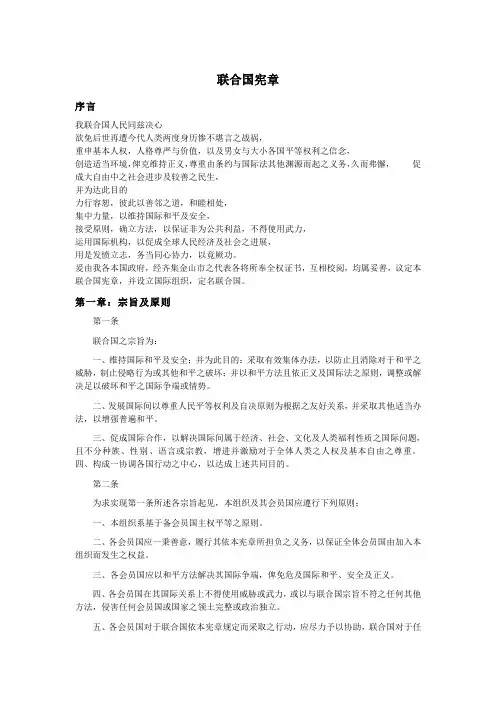
联合国宪章序言我联合国人民同兹决心欲免后世再遭今代人类两度身历惨不堪言之战祸,重申基本人权,人格尊严与价值,以及男女与大小各国平等权利之信念,创造适当环境,俾克维持正义,尊重由条约与国际法其他渊源而起之义务,久而弗懈,促成大自由中之社会进步及较善之民生,并为达此目的力行容恕,彼此以善邻之道,和睦相处,集中力量,以维持国际和平及安全,接受原则,确立方法,以保证非为公共利益,不得使用武力,运用国际机构,以促成全球人民经济及社会之进展,用是发愤立志,务当同心协力,以竟厥功。
爰由我各本国政府,经齐集金山市之代表各将所奉全权证书,互相校阅,均属妥善,议定本联合国宪章,并设立国际组织,定名联合国。
第一章:宗旨及原则第一条联合国之宗旨为:一、维持国际和平及安全;并为此目的:采取有效集体办法,以防止且消除对于和平之威胁,制止侵略行为或其他和平之破坏;并以和平方法且依正义及国际法之原则,调整或解决足以破坏和平之国际争端或情势。
二、发展国际间以尊重人民平等权利及自决原则为根据之友好关系,并采取其他适当办法,以增强普遍和平。
三、促成国际合作,以解决国际间属于经济、社会、文化及人类福利性质之国际问题,且不分种族、性别、语言或宗教,增进并激励对于全体人类之人权及基本自由之尊重。
四、构成一协调各国行动之中心,以达成上述共同目的。
第二条为求实现第一条所述各宗旨起见,本组织及其会员国应遵行下列原则:一、本组织系基于备会员国主权平等之原则。
二、各会员国应一秉善意,履行其依本宪章所担负之义务,以保证全体会员国由加入本组织而发生之权益。
三、各会员国应以和平方法解决其国际争端,俾免危及国际和平、安全及正义。
四、各会员国在其国际关系上不得使用威胁或武力,或以与联合国宗旨不符之任何其他方法,侵害任何会员国或国家之领土完整或政治独立。
五、各会员国对于联合国依本宪章规定而采取之行动,应尽力予以协助,联合国对于任何国家正在采取防止或执行行动时,各会员国对该国不得给予协助。
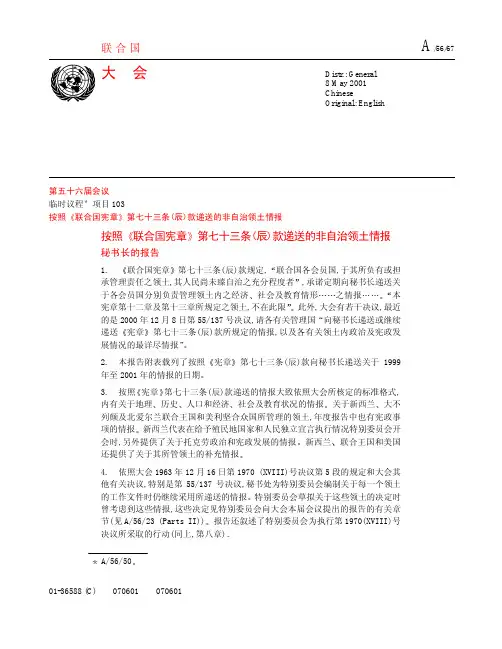
联合国A /56/67大 会Distr.: General 8 May 2001 ChineseOriginal: English01-36588 (C) 070601 070601第五十六届会议临时议程 项目103按照联合国宪章第七十三条(辰)款递送的非自治领土情报按照联合国宪章第七十三条(辰)款递送的非自治领土情报秘书长的报告1. 联合国宪章第七十三条(辰)款规定,联合国各会员国,于其所负有或担承管理责任之领土,其人民尚未臻自治之充分程度者,承诺定期向秘书长递送关于各会员国分别负责管理领土内之经济社会及教育情形之情报本宪章第十二章及第十三章所规定之领土,不在此限此外,大会有若干决议,最近的是2000年12月8日第55/137号决议,请各有关管理国向秘书长递送或继续递送宪章第七十三条(辰)款所规定的情报,以及各有关领土内政治及宪政发展情况的最详尽情报2.本报告附表载列了按照宪章第七十三条(辰)款向秘书长递送关于1999年至2001年的情报的日期3. 按照宪章第七十三条(辰)款递送的情报大致依照大会所核定的标准格式,内有关于地理历史人口和经济社会及教育状况的情报关于新西兰大不列颠及北爱尔兰联合王国和美利坚合众国所管理的领土,年度报告中也有宪政事项的情报新西兰代表在给予殖民地国家和人民独立宣言执行情况特别委员会开会时,另外提供了关于托克劳政治和宪政发展的情报新西兰联合王国和美国还提供了关于其所管领土的补充情报4. 依照大会1963年12月16日第1970 (XVIII)号决议第5段的规定和大会其他有关决议,特别是第55/137号决议,秘书处为特别委员会编制关于每一个领土的工作文件时仍继续采用所递送的情报特别委员会草拟关于这些领土的决定时曾考虑到这些情报,这些决定见特别委员会向大会本届会议提出的报告的有关章节(见A/56/23 (Parts II))报告还叙述了特别委员会为执行第1970(XVIII)号决议所采取的行动(同上,第八章)A/56/50A/56/67附件按照联合国宪章第七十三条(辰)款递送情报的日期及情报所涉期间a2000年收到的情报 2001年收到的情报递送日期所涉期间递送日期所涉期间法国b新喀里多尼亚c- - - - 新西兰(7月1日至6月30日)d2001年2月23日 2000-2001年托克劳 2000年3月31日1999年7月-2000年3月葡萄牙东帝汶e- - - - 西班牙西撒哈拉f- - - - 大不列颠及北爱尔兰联合王国安圭拉 2000年5月9日1997-1999年 2001年4月12日1998-2003年百慕大 2000年5月3日1997-2001年 - -英属维尔京群岛 2000年5月9日 2000年4月 2001年4月25日1998-2001年开曼群岛 2000年5月3日1998年 2001年4月12日1999年福克兰(马尔维纳斯)群岛2000年5月5日1998年6月-2001年5月3日 2000-2001年1999年7月直布罗陀 2000年5月3日1999年 2001年4月12日2000年2001年4月25日2001年4月25日1999-2002年-蒙特塞拉特 -皮特凯恩 2000年5月9日 2000年4月 - -2001年4月25日 2000-2003年圣赫勒拿 --特克斯和凯科斯群岛 2000年5月8日1998-2003年 - - 美利坚合众国g(10月1日至9月30日)2001年3月28日2000-2005年美属萨摩亚 --2001年3月21日2000-2005年关岛 --2001年3月31日2000-2005年-美属维尔京群岛 -2A/56/67a关于适用给予殖民地国家和人民独立宣言(大会1960年12月14日第1514 (XV)号决议)的领土的暂定名单,见大会正式记录,第十八届会议,附件,议程项目23增编(A/5446/Rev.1),附件一b 法国政府没有按照联合国宪章第七十三条辰款递送情报但法国在2000年向秘书处提供了一份关于新喀里多尼亚情况的报告c大会1986年12月2日第41/41 A号决议认为新喀里多尼亚按照联合国宪章第十一章和大会第1514 (XV)号和第1541 (XV)号决议的规定,属于宪章所称的非自治领土d所指时期是由所列年度的7月1日至翌年6月30日e安全理事会1999年10月25日第12721999号决议设立的联合国东帝汶过渡行政当局受权全面负责管理东帝汶直至该领土独立为止f西班牙常驻联合国代表1976年2月26日通知秘书长:西班牙政府从今天起断然终止它在撒哈拉领土的存在,并认为有必要正式声明如下:(a) 西班牙今后对该领土的管理不负任何国际责任,因为它已停止参加为该领土设立的临时管理机构(A/31/56-S/11997),印本见安全理事会正式记录,第三十一年,1976年1月2月和3月补编g所指时期是由上年度的10月1日至所列年度9月30日––––––––––––––––3。
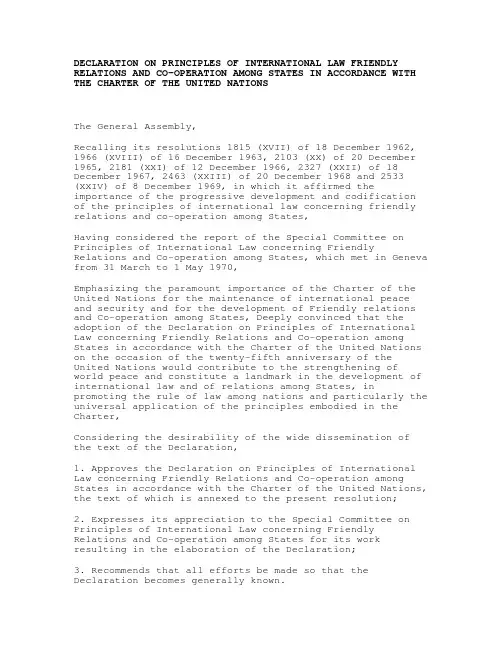
DECLARATION ON PRINCIPLES OF INTERNATIONAL LAW FRIENDLY RELATIONS AND CO-OPERATION AMONG STATES IN ACCORDANCE WITH THE CHARTER OF THE UNITED NATIONSThe General Assembly,Recalling its resolutions 1815 (XVII) of 18 December 1962, 1966 (XVIII) of 16 December 1963, 2103 (XX) of 20 December 1965, 2181 (XXI) of 12 December 1966, 2327 (XXII) of 18 December 1967, 2463 (XXIII) of 20 December 1968 and 2533 (XXIV) of 8 December 1969, in which it affirmed the importance of the progressive development and codificationof the principles of international law concerning friendly relations and co-operation among States,Having considered the report of the Special Committee on Principles of International Law concerning FriendlyRelations and Co-operation among States, which met in Geneva from 31 March to 1 May 1970,Emphasizing the paramount importance of the Charter of the United Nations for the maintenance of international peace and security and for the development of Friendly relations and Co-operation among States, Deeply convinced that the adoption of the Declaration on Principles of International Law concerning Friendly Relations and Co-operation among States in accordance with the Charter of the United Nations on the occasion of the twenty-fifth anniversary of theUnited Nations would contribute to the strengthening ofworld peace and constitute a landmark in the development of international law and of relations among States, inpromoting the rule of law among nations and particularly the universal application of the principles embodied in the Charter,Considering the desirability of the wide dissemination ofthe text of the Declaration,1. Approves the Declaration on Principles of International Law concerning Friendly Relations and Co-operation among States in accordance with the Charter of the United Nations, the text of which is annexed to the present resolution;2. Expresses its appreciation to the Special Committee on Principles of International Law concerning FriendlyRelations and Co-operation among States for its workresulting in the elaboration of the Declaration;3. Recommends that all efforts be made so that theDeclaration becomes generally known.1883rd plenary meeting, 24 October 1970ANNEXDECLARATION ON PRINCIPLES OF INTERNATIONAL LAW CONCERNING FRIENDLY RELATIONS AND CO-OPERATION AMONG STATES IN ACCORDANCE WITH THE CHARTER OF THE UNITED NATIONSPREAMBLEThe General Assembly,Reaffirming in the terms of the Charter of the UnitedNations that the maintenance of international peace and security and the development of friendly relations and co-operation between nations are among the fundamental purposes of the United Nations,Recalling that the peoples of the United Nations are determined to practise tolerance and live together in peace with one another as good neighbours,Bearing in mind the importance of maintaining and strengthening international peace founded upon freedom, equality, justice and respect for fundamental human rights and of developing friendly relations among nationsirrespective of their political, economic and social systems or the levels of their development,Bearing in mind also the paramount importance of the Charter of the United Nations in the promotion of the rule of law among nations,Considering that the faithful observance of the principlesof international law concerning friendly relations and co-operation among States and the fulfillment in good faith of the obligations assumed by States, in accordance with the Charter, is of the greatest importance for the maintenanceof international peace and security and for theimplementation of the other purposes of the United Nations,Noting that the great political, economic and social changes and scientific progress which have taken place in the world since the adoption of the Charter give increased importance to these principles and to the need for their more effective application in the conduct of States wherever carried on,Recalling the established principle that outer space, including the Moon and other celestial bodies, is notsubject to national appropriation by claim of sovereignty, by means of use or occupation, or by any other means, and mindful of the fact that consideration is being given in theUnited Nations to the question of establishing other appropriate provisions similarly inspired,Convinced that the strict observance by States of the obligation not to intervene in the affairs of any otherState is an essential condition to ensure that nations live together in peace with one another, since the practice of any form of intervention not only violates the spirit and letter of the Charter, but also leads to the creation of situations which threaten international peace and security,Recalling the duty of States to refrain in theirinternational relations from military, political, economicor any other form of coercion aimed against the political independence or territorial integrity of any State,Considering it essential that all States shall refrain in their international relations from the threat or use offorce against the territorial integrity or political independence of any State, or in any other mannerinconsistent with the purposes of the United Nations,Considering it equally essential that all States shallsettle their international disputes by peaceful means in accordance with the Charter,Reaffirming, in accordance with the Charter, the basic importance of sovereign equality and stressing that the purposes of the United Nations can be implemented only if States enjoy sovereign equality and comply fully with the requirements of this principle in their international relations,Convinced that the subjection of peoples to alien subjugation, domination and exploitation constitutes a major obstacle to the promotion of international peace and security, Convinced that the principle of equal rights and self-determination of peoples constitutes a significant contribution to contemporary international law, and that its effective application is of paramount importance for the promotion of friendly relations among States, based on respect for the principle of sovereign equality,Convinced in consequence that any attempt aimed at thepartial or total disruption of the national unity and territorial integrity of a State or country or at itspolitical independence is incompatible with the purposes and principles of the Charter,Considering the provisions of the Charter as a whole and taking into account the role of relevant resolutions adoptedby the competent organs of the United Nations relating tothe content of the principles,Considering that the progressive development andcodification of the following principles:(a) The principle that States shall refrain in their international relations from the threat or use of force against the territorial integrity or political independenceof any State, or in any other manner inconsistent with the purposes of the United Nations,(b) The principle that States shall settle theirinternational disputes by peaceful means in such a mannerthat international peace and security and justice are not endangered,(c) The duty not to intervene in matters within the domestic jurisdiction of any State, in accordance with the Charter,(d) The duty of States to co-operate with one another in accordance with the Charter,(e) The principle of equal rights and self-determination of peoples,(f) The principle of sovereign equality of States,(g) The principle that States shall fulfil in good faith the obligations assumed by them in accordance with the Charter,so as to secure their more effective application within the international community, would promote the realization ofthe purposes of the United Nations,Having considered the principles of international lawrelating to friendly relations and co-operation among States,1. Solemnly proclaims the following principles:The principle that States shall refrain in theirinternational ~ relations from the threat or use of force against the territorial integrity or political independenceof any State or in any other manner inconsistent with the purposes of the United NationsEvery State has the duty to refrain in its international relations from the threat or use of force against theterritorial integrity or political independence of any State, or in any other manner inconsistent with the purposes of the United Nations. Such a threat or use of force constitutes aviolation of international law and the Charter of the United Nations and shall never be employed as a means of settling international issues.A war of aggression constitutes a crime against the peace, for which there is responsibility under international law.In accordance with the purposes and principles of the United Nations, States have the duty to refrain from propaganda for wars of aggression.Every State has the duty to refrain from the threat or useof force to violate the existing international boundaries of another State or as a means of solving international disputes, including territorial disputes and problems concerning frontiers of States.Every State likewise has the duty to refrain from the threat or use of force to violate international lines of demarcation, such as armistice lines, established by or pursuant to an international agreement to which it is aparty or which it is otherwise bound to respect. Nothing in the foregoing shall be construed as prejudicing thepositions of the parties concerned with regard to the status and effects of such lines under their special regimes or as affecting their temporary character.States have a duty to refrain from acts of reprisalinvolving the use of force.Every State has the duty to refrain from any forcible action which deprives peoples referred to in the elaboration of the principle of equal rights and self-determination of their right to self-determination and freedom and independence.Every State has the duty to refrain from organizing or encouraging the organization of irregular forces or armed bands including mercenaries, for incursion into theterritory of another State.Every State has the duty to refrain from organizing, instigating, assisting or participating in acts of civil strife or terrorist acts in another State or acquiescing in organized activities within its territory directed towards the commission of such acts, when the acts referred to inthe present paragraph involve a threat or use of force.The territory of a State shall not be the object of military occupation resulting from the use of force in contravention of the provisions of the Charter. The territory of a State shall not be the object of acquisition by another State resulting from the threat or use of force. No territorialacquisition resulting from the threat or use of force shall be recognized as legal. Nothing in the foregoing shall be construed as affecting:(a) Provisions of the Charter or any international agreement prior to the Charter regime and valid under international law; or(b) The powers of the Security Council under the Charter.All States shall pursue in good faith negotiations for the early conclusion of a universal treaty on general and complete disarmament under effective international control and strive to adopt appropriate measures to reduce international tensions and strengthen confidence among States.All States shall comply in good faith with their obligations under the generally recognized principles and rules of international law with respect to the maintenance of international peace and security, and shall endeavour to make the United Nations security system based on the Charter more effective.Nothing in the foregoing paragraphs shall be construed as enlarging or diminishing in any way the scope of the provisions of the Charter concerning cases in which the use of force is lawful.The principle that States shall settle their international disputes by peaceful means in such a manner thatinternational peace and security and justice are not endangeredEvery State shall settle its international disputes with other States by peaceful means in such a manner that international peace and security and justice are not endangered.States shall accordingly seek early and just settlement of their international disputes by negotiation, inquiry, mediation, conciliation, arbitration, judicial settlement, resort to regional agencies or arrangements or otherpeaceful means of their choice. In seeking such a settlement the parties shall agree upon such peaceful means as may be appropriate to the circumstances and nature of the dispute.The parties to a dispute have the duty, in the event of failure to reach a solution by any one of the above peaceful means, to continue to seek a settlement of the dispute by other peaceful means agreed upon by them.States parties to an international dispute, as well as other States shall refrain from any action which may aggravate the Situation so as to endanger the maintenance of international peace and security, and shall act in accordance with the purposes and principles of the United Nations.International disputes shall be settled on the basis of the Sovereign equality of States and in accordance with the Principle of free choice of means. Recourse to, oracceptance of, a settlement procedure freely agreed to by States with regard to existing or future disputes to which they are parties shall not be regarded as incompatible with sovereign equality.Nothing in the foregoing paragraphs prejudices or derogates from the applicable provisions of the Charter, in particular those relating to the pacific settlement of international disputes.The principle concerning the duty not to intervene inmatters within the domestic jurisdiction of any State, in accordance with the CharterNo State or group of States has the right to intervene, directly or indirectly, for any reason whatever, in the internal or external affairs of any other State. Consequently, armed intervention and all other forms of interference or attempted threats against the personality of the State or against its political, economic and cultural elements, are in violation of international law.No State may use or encourage the use of economic politicalor any other type of measures to coerce another State inorder to obtain from it the subordination of the exercise of its sovereign rights and to secure from it advantages of any kind. Also, no State shall organize, assist, foment, finance, incite or tolerate subversive, terrorist or armed activities directed towards the violent overthrow of the regime of another State, or interfere in civil strife in another State.The use of force to deprive peoples of their nationalidentity constitutes a violation of their inalienable rights and of the principle of non-intervention.Every State has an inalienable right to choose its political, economic, social and cultural systems, without interferencein any form by another State.Nothing in the foregoing paragraphs shall be construed as reflecting the relevant provisions of the Charter relatingto the maintenance of international peace and security.The duty of States to co-operate with one another in accordance with the CharterStates have the duty to co-operate with one another, irrespective of the differences in their political, economic and social systems, in the various spheres of international relations, in order to maintain international peace and security and to promote international economic stability and progress, the general welfare of nations and internationalco-operation free from discrimination based on such differences.To this end:(a) States shall co-operate with other States in the maintenance of international peace and security;(b) States shall co-operate in the promotion of universal respect for, and observance of, human rights and fundamental freedoms for all, and in the elimination of all forms ofracial discrimination and all forms of religious intolerance;(c) States shall conduct their international relations inthe economic, social, cultural, technical and trade fieldsin accordance with the principles of sovereign equality and non-intervention;(d) States Members of the United Nations have the duty totake joint and separate action in co-operation with theUnited Nations in accordance with the relevant provisions of the Charter.States should co-operate in the economic, social andcultural fields as well as in the field of science and technology and for the promotion of international cultural and educational progress. States should co-operate in the promotion of economic growth throughout the world,especially that of the developing countries.The principle of equal rights and self-determination of peoplesBy virtue of the principle of equal rights and self-determination of peoples enshrined in the Charter of the United Nations, all peoples have the right freely to determine, without external interference, their political status and to pursue their economic, social and cultural development, and every State has the duty to respect thisright in accordance with the provisions of the Charter.Every State has the duty to promote, through joint and separate action, realization of the principle of equalrights and self-determination of peoples, in accordance with the provisions of the Charter, and to render assistance to the United Nations in carrying out the responsibilities entrusted to it by the Charter regarding the implementation of the principle, in order:(a) To promote friendly relations and co-operation among States; and(b) To bring a speedy end to colonialism, having due regard to the freely expressed will of the peoples concerned;and bearing in mind that subjection of peoples to alien subjugation, domination and exploitation constitutes a violation of the principle, as well as a denial of fundamental human rights, and is contrary to the Charter.Every State has the duty to promote through joint and separate action universal respect for and observance of human rights and fundamental freedoms in accordance with the Charter.The establishment of a sovereign and independent State, the free association or integration with an independent State or the emergence into any other political status freely determined by a people constitute modes of implementing the right of self-determination by that people.Every State has the duty to refrain from any forcible action which deprives peoples referred to above in the elaboration of the present principle of their right to self-determination and freedom and independence. In their actions against, and resistance to, such forcible action in pursuit of the exercise of their right to self-determination, such peoples are entitled to seek and to receive support in accordance with the purposes and principles of the Charter.The territory of a colony or other Non-Self-Governing Territory has, under the Charter, a status separate and distinct from the territory of the State administering it; and such separate and distinct status under the Chartershall exist until the people of the colony or Non-Self-Governing Territory have exercised their right of self-determination in accordance with the Charter, andparticularly its purposes and principles.Nothing in the foregoing paragraphs shall be construed as authorizing or encouraging any action which would dismember or impair, totally or in part, the territorial integrity or political unity of sovereign and independent States conducting themselves in compliance with the principle of equal rights and self-determination of peoples as describedabove and thus possessed of a government representing the whole people belonging to the territory without distinction as to race, creed or colour.Every State shall refrain from any action aimed at thepartial or total disruption of the national unity and territorial integrity of any other State or country.The principle of sovereign equality of StatesAll States enjoy sovereign equality. They have equal rights and duties and are equal members of the international community, notwithstanding differences of an economic, social, political or other nature.In particular, sovereign equality includes the following elements:(a) States are judicially equal;(b) Each State enjoys the rights inherent in full sovereignty;(c) Each State has the duty to respect the personality of other States;(d) The territorial integrity and political independence of the State are inviolable;(e) Each State has the right freely to choose and developits political, social, economic and cultural systems;(f) Each State has the duty to comply fully and in goodfaith with its international obligations and to live in peace with other States.The principle that States shall fulfil in good faith the obligations assumed by them in accordance with the Charter-:Every State has the duty to fulfil in good faith the obligations assumed by it in accordance with the Charter of the United Nations.Every State has the duty to fulfil in good faith its obligations under the generally recognized principles and rules of international law.Every State has the duty to fulfil in good faith its obligations under international agreements valid under the generally recognized principles and rules of international law.Where obligations arising under international agreements are in conflict with the obligations of Members of the United Nations under the Charter of the United Nations, the obligations under the Charter shall prevail.GENERAL PART2. Declares that:In their interpretation and application the above principles are interrelated and each principle should be construed in the context of the other principles. Nothing in this Declaration shall be construed as prejudicing in any manner the provisions of the Charter or the rights and duties of Member States under the Charter or the rights of peoples under the Charter, taking into account the elaboration of these rights in this Declaration.;3. Declares further that: The principles of the Charterwhich are embodied in this Declaration constitute basic principles of international law, and consequently appeals to all States to be guided by these principles in their international conduct and to develop their mutual relations on the basis of the strict observance of these principles.。

联合国宪章序言我联合国人民同兹决心欲免后世再遭今代人类两度身历惨不堪言之战祸,重申基本人权,人格尊严与价值,以及男女与大小各国平等权利之信念,创造适当环境,俾克维持正义,尊重由条约与国际法其他渊源而起之义务,久而弗懈,促成大自由中之社会进步及较善之民生,并为达此目的力行容恕,彼此以善邻之道,和睦相处,集中力量,以维持国际和平及安全,接受原则,确立方法,以保证非为公共利益,不得使用武力,运用国际机构,以促成全球人民经济及社会之进展,用是发愤立志,务当同心协力,以竟厥功。
爰由我各本国政府,经齐集金山市之代表各将所奉全权证书,互相校阅,均属妥善,议定本联合国宪章,并设立国际组织,定名联合国。
第一章:宗旨及原则第一条联合国之宗旨为:一、维持国际和平及安全;并为此目的:采取有效集体办法,以防止且消除对于和平之威胁,制止侵略行为或其他和平之破坏;并以和平方法且依正义及国际法之原则,调整或解决足以破坏和平之国际争端或情势。
二、发展国际间以尊重人民平等权利及自决原则为根据之友好关系,并采取其他适当办法,以增强普遍和平。
三、促成国际合作,以解决国际间属于经济、社会、文化及人类福利性质之国际问题,且不分种族、性别、语言或宗教,增进并激励对于全体人类之人权及基本自由之尊重。
四、构成一协调各国行动之中心,以达成上述共同目的。
第二条为求实现第一条所述各宗旨起见,本组织及其会员国应遵行下列原则:一、本组织系基于备会员国主权平等之原则。
二、各会员国应一秉善意,履行其依本宪章所担负之义务,以保证全体会员国由加入本组织而发生之权益。
三、各会员国应以和平方法解决其国际争端,俾免危及国际和平、安全及正义。
四、各会员国在其国际关系上不得使用威胁或武力,或以与联合国宗旨不符之任何其他方法,侵害任何会员国或国家之领土完整或政治独立。
五、各会员国对于联合国依本宪章规定而采取之行动,应尽力予以协助,联合国对于任何国家正在采取防止或执行行动时,各会员国对该国不得给予协助。
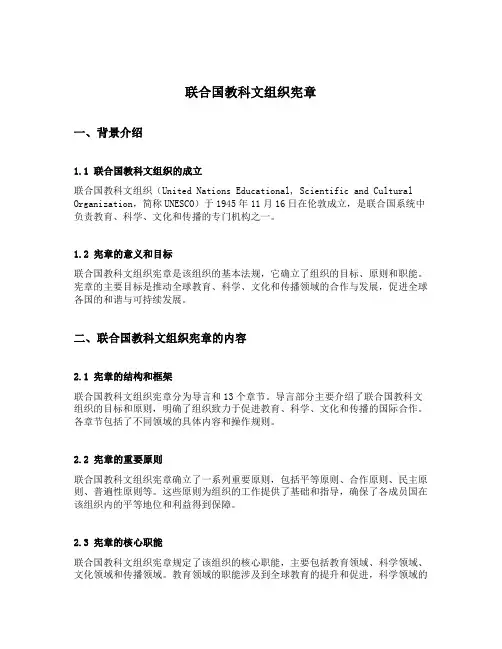
联合国教科文组织宪章一、背景介绍1.1 联合国教科文组织的成立联合国教科文组织(United Nations Educational, Scientific and Cultural Organization,简称UNESCO)于1945年11月16日在伦敦成立,是联合国系统中负责教育、科学、文化和传播的专门机构之一。
1.2 宪章的意义和目标联合国教科文组织宪章是该组织的基本法规,它确立了组织的目标、原则和职能。
宪章的主要目标是推动全球教育、科学、文化和传播领域的合作与发展,促进全球各国的和谐与可持续发展。
二、联合国教科文组织宪章的内容2.1 宪章的结构和框架联合国教科文组织宪章分为导言和13个章节。
导言部分主要介绍了联合国教科文组织的目标和原则,明确了组织致力于促进教育、科学、文化和传播的国际合作。
各章节包括了不同领域的具体内容和操作规则。
2.2 宪章的重要原则联合国教科文组织宪章确立了一系列重要原则,包括平等原则、合作原则、民主原则、普遍性原则等。
这些原则为组织的工作提供了基础和指导,确保了各成员国在该组织内的平等地位和利益得到保障。
2.3 宪章的核心职能联合国教科文组织宪章规定了该组织的核心职能,主要包括教育领域、科学领域、文化领域和传播领域。
教育领域的职能涉及到全球教育的提升和促进,科学领域的职能涉及到科学研究的推动和科技的发展,文化领域的职能涉及到文化保护和文化多样性的维护,传播领域的职能涉及到信息传播的促进和媒体发展的支持。
三、联合国教科文组织宪章的意义和影响3.1 促进全球教育发展联合国教科文组织通过宪章规定的职能与各成员国开展合作,促进全球教育的发展。
组织通过制定教育政策、共享最佳实践和提供技术援助等方式,努力实现教育的普及和提高教育质量,尤其关注贫困地区和弱势群体的教育问题。
3.2 推动科学与技术创新联合国教科文组织宪章明确组织的职能包括推动科学与技术的研究和发展。
组织鼓励各成员国加强科学研究和合作,推动科技创新,为解决全球面临的诸多挑战提供科学的支撑和解决方案。

联合国宪章序言我联合国人民同兹决心欲免后世再遭今代人类两度身历惨不堪言之战祸,重申基本人权,人格尊严与价值,以及男女与大小各国平等权利之信念,创造适当环境,俾克维持正义,尊重由条约与国际法其他渊源而起之义务,久而弗懈,促成大自由中之社会进步及较善之民生,并为达此目的力行容恕,彼此以善邻之道,和睦相处,集中力量,以维持国际和平及安全,接受原则,确立方法,以保证非为公共利益,不得使用武力,运用国际机构,以促成全球人民经济及社会之进展,用是发愤立志,务当同心协力,以竟厥功。
爰由我各本国政府,经齐集金山市之代表各将所奉全权证书,互相校阅,均属妥善,议定本联合国宪章,并设立国际组织,定名联合国。
第一章:宗旨及原则第一条联合国之宗旨为:一、维持国际和平及安全;并为此目的:采取有效集体办法,以防止且消除对于和平之威胁,制止侵略行为或其他和平之破坏;并以和平方法且依正义及国际法之原则,调整或解决足以破坏和平之国际争端或情势。
二、发展国际间以尊重人民平等权利及自决原则为根据之友好关系,并采取其他适当办法,以增强普遍和平。
三、促成国际合作,以解决国际间属于经济、社会、文化及人类福利性质之国际问题,且不分种族、性别、语言或宗教,增进并激励对于全体人类之人权及基本自由之尊重。
四、构成一协调各国行动之中心,以达成上述共同目的。
第二条为求实现第一条所述各宗旨起见,本组织及其会员国应遵行下列原则:一、本组织系基于备会员国主权平等之原则。
二、各会员国应一秉善意,履行其依本宪章所担负之义务,以保证全体会员国由加入本组织而发生之权益。
三、各会员国应以和平方法解决其国际争端,俾免危及国际和平、安全及正义。
四、各会员国在其国际关系上不得使用威胁或武力,或以与联合国宗旨不符之任何其他方法,侵害任何会员国或国家之领土完整或政治独立。
五、各会员国对于联合国依本宪章规定而采取之行动,应尽力予以协助,联合国对于任何国家正在采取防止或执行行动时,各会员国对该国不得给予协助。
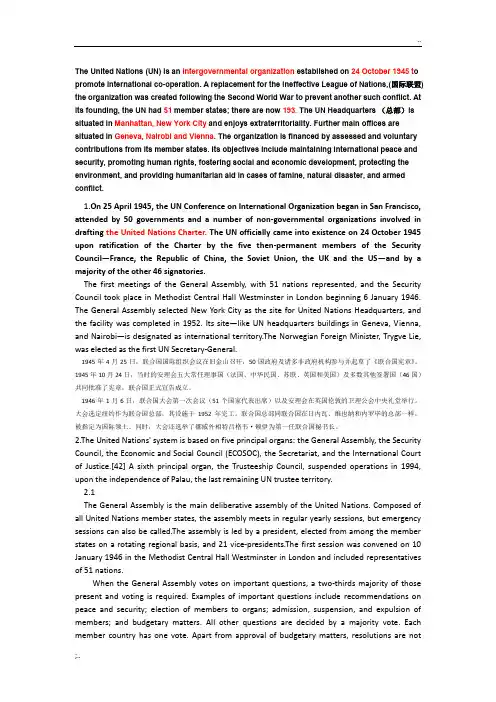
The United Nations (UN) is an intergovernmental organization established on 24 October 1945 t o promote international co-operation. A replacement for the ineffective League of Nations,(国际联盟) the organization was created following the Second World War to prevent another such conflict. At its founding, the UN had 51 member states; there are now 193. The UN Headquarters (总部)is situated in Manhattan, New York City and enjoys extraterritoriality. Further main offices are situated in Geneva, Nairobi and Vienna. The organization is financed by assessed and voluntary contributions from its member states. Its objectives include maintaining international peace and security, promoting human rights, fostering social and economic development, protecting the environment, and providing humanitarian aid in cases of famine, natural disaster, and armed conflict.1.On 25 April 1945, the UN Conference on International Organization began in San Francisco, attended by 50 governments and a number of non-governmental organizations involved in drafting the United Nations Charter. The UN officially came into existence on 24 October 1945 upon ratification of the Charter by the five then-permanent members of the Security Council—France, the Republic of China, the Soviet Union, the UK and the US—and by a majority of the other 46 signatories.The first meetings of the General Assembly, with 51 nations represented, and the Security Council took place in Methodist Central Hall Westminster in London beginning 6 January 1946. The General Assembly selected New York City as the site for United Nations Headquarters, and the facility was completed in 1952. Its site—like UN headquarters buildings in Geneva, Vienna, and Nairobi—is designated as international territory.The Norwegian Foreign Minister, Trygve Lie, was elected as the first UN Secretary-General.1945年4月25日,联合国国际组织会议在旧金山召开,50国政府及诸多非政府机构参与并起草了《联合国宪章》。
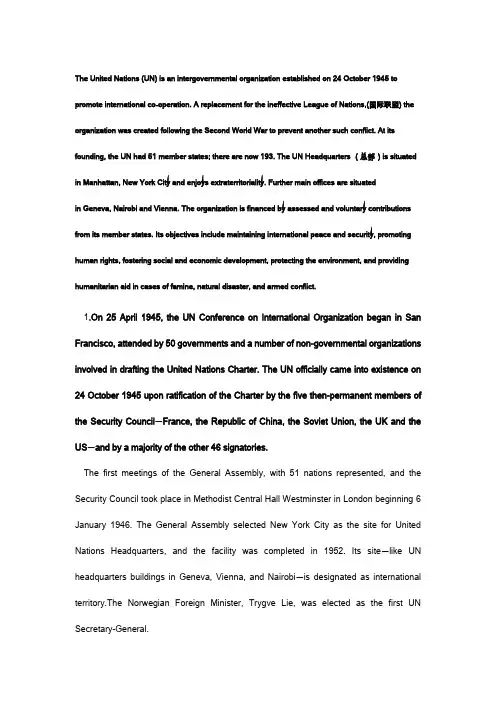
The United Nations(UN) is an intergovernmental organization established on 24 October 1945 to promote international co-operation. A replacement for the ineffective League of Nations,(国际联盟) the organization was created following the Second World War to prevent another such conflict. At its founding, the UN had 51member states; there are now 193. The UN Headquarters(总部)is situated in Manhattan,New York City and enjoys extraterritoriality. Further main offices are situatedin Geneva,Nairobi and Vienna. The organization is financed by assessed and voluntary contributions from its member states. Its objectives include maintaining international peace and security, promoting human rights, fostering social and economic development, protecting the environment, and providing humanitarian aid in cases of famine, natural disaster, and armed conflict.1.On 25 April 1945, the UN Conference on International Organization began in San Francisco, attended by 50 governments and a number of non-governmental organizations involved in drafting the United Nations Charter. The UN officially came into existence on 24 October 1945 upon ratification of the Charter by the five then-permanent members of the Security Council—France, the Republic of China, the Soviet Union, the UK and the US—and by a majority of the other 46 signatories.The first meetings of the General Assembly, with 51 nations represented, and the Security Council took place in Methodist Central Hall Westminster in London beginning 6 January 1946. The General Assembly selected New York City as the site for United Nations Headquarters, and the facility was completed in 1952. Its site—like UN headquarters buildings in Geneva, Vienna, and Nairobi—is designated as international territory.The Norwegian Foreign Minister, Trygve Lie, was elected as the first UN Secretary-General.1945年4月25日,联合国国际组织会议在旧金山召开,50国政府及诸多非政府机构参与并起草了《联合国宪章》。
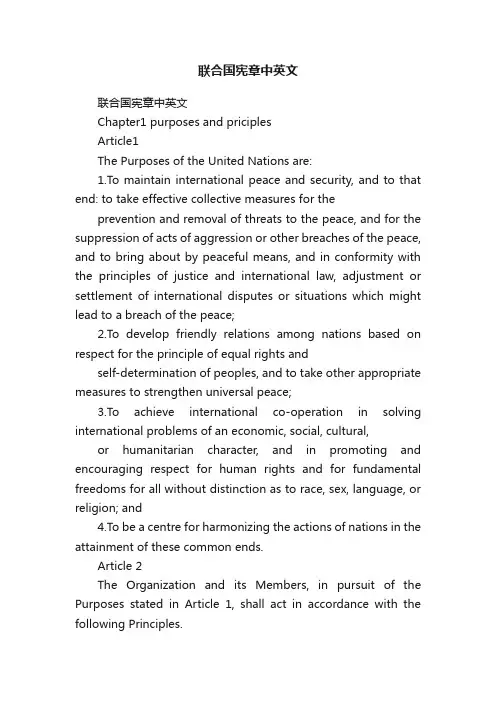
联合国宪章中英文联合国宪章中英文Chapter1 purposes and priciplesArticle1The Purposes of the United Nations are:1.To maintain international peace and security, and to that end: to take effective collective measures for theprevention and removal of threats to the peace, and for the suppression of acts of aggression or other breaches of the peace, and to bring about by peaceful means, and in conformity with the principles of justice and international law, adjustment or settlement of international disputes or situations which might lead to a breach of the peace;2.To develop friendly relations among nations based on respect for the principle of equal rights andself-determination of peoples, and to take other appropriate measures to strengthen universal peace;3.To achieve international co-operation in solving international problems of an economic, social, cultural, or humanitarian character, and in promoting and encouraging respect for human rights and for fundamental freedoms for all without distinction as to race, sex, language, or religion; and4.To be a centre for harmonizing the actions of nations in the attainment of these common ends.Article 2The Organization and its Members, in pursuit of the Purposes stated in Article 1, shall act in accordance with the following Principles.1.The Organization is based on the principle of the sovereign equality of all its Members.2.All Members, in order to ensure to all of them the rights and benefits resulting from membership, shallfulfill in good faith the obligations assumed by them in accordance with the present Charter.3.All Members shall settle their international disputes by peaceful means in such a manner thatinternational peace and security, and justice, are not endangered.4.All Members shall refrain in their international relations from the threat or use of force against theterritorial integrity or political independence of any state, or in any other manner inconsistent with the Purposes of the United Nations.5.All Members shall give the United Nations every assistance in any action it takes in accordance with thepresent Charter, and shall refrain from giving assistance to any state against which the United Nations is taking preventive or enforcement action.6.The Organization shall ensure that states which are not Members of the United Nations act in accordancewith these Principles so far as may be necessary for the maintenance of international peace and security.7.Nothing contained in the present Charter shall authorize the United Nations to intervene in matters whichare essentially within the domestic jurisdiction of any state or shall require the Members to submit such matters to settlement under the present Charter; but this principle shall not prejudice the application of enforcement measures under Chapter Vll.第一条联合国之宗旨为:一、维持国际和平及安全;并为此目的:采取有效集体办法,以防止且消除对于和平之威胁,制止侵略行为或其他和平之破坏;并以和平方法且依正义及国际法之原则,调整或解决足以破坏和平之国际争端或情势。
The United Nations(UN) is an intergovernmental organization established on 24 October 1945 to promote international co-operation. A replacement for the ineffective League of Nations,(国际联盟) the organization was created following the Second World War to prevent another such conflict. At its founding, the UN had 51member states; there are now 193. The UN Headquarters(总部)is situated in Manhattan,New York City and enjoys extraterritoriality. Further main offices are situated in Geneva,Nairobi and Vienna. The organization is financed by assessed and voluntary contributions from its member states. Its objectives include maintaining international peace and security, promoting human rights, fostering social and economic development, protecting the environment, and providing humanitarian aid in cases of famine, natural disaster, and armed conflict.1.On 25 April 1945, the UN Conference on International Organization began in San Francisco, attended by 50 governments and a number of non-governmental organizations involved in drafting the United Nations Charter. The UN officially came into existence on 24 October 1945 upon ratification of the Charter by the five then-permanent members of the Security Council—France, the Republic of China, the Soviet Union, the UK and the US—and by a majority of the other 46 signatories. The first meetings of the General Assembly, with 51 nations represented, and the Security Council took place in Methodist Central Hall Westminster in London beginning 6 January 1946. The General Assembly selected New York City as the site for United Nations Headquarters, and the facility was completed in 1952. Its site—like UN headquarters buildings in Geneva, Vienna, and Nairobi—is designated as international territory.The Norwegian Foreign Minister, Trygve Lie, was elected as the first UN Secretary-General.1945年4月25日,联合国国际组织会议在旧金山召开,50国政府及诸多非政府机构参与并起草了《联合国宪章》。
联合国宪章联合国宪章,全称《联合国联盟宪章》,是联合国成立的基本法律文件。
它于1945年6月26日签署,并于同年10月24日生效,成为联合国组织的根本大法。
背景联合国宪章的签署是二战结束后国际社会为维护世界和平与安全,促进国际合作而采取的重要举措。
在战后的混乱和分裂的背景下,国际社会需要建立一个组织,以推动国际合作和解决冲突。
联合国作为这个组织应运而生。
目标与原则联合国宪章的目标是维护国际和平与安全、促进国际合作、促进人权和促进经济与社会发展。
其最高原则包括国家主权、领土完整、国际和平与安全、不干涉内政、平等和互相尊重、解决争端和建立国际法治。
组织结构联合国宪章规定了联合国的组织结构和制度安排。
联合国最高机构是大会和安全理事会,其他机构包括经济社会理事会、国际法院和秘书处等。
宪章还规定了各机构的职责和权力,以及成员国的权益和义务。
大会联合国大会是联合国的最高决策机构,由全体会员国组成。
大会每年举行一次常规会议,会员国代表在会上讨论和决定一系列问题,包括国际和平与安全、经济与社会发展、人权等。
安全理事会联合国安全理事会负责维护国际和平与安全。
安全理事会由15个理事国组成,其中5个是常任理事国,包括中国、美国、俄罗斯、法国和英国。
其他10个理事国每两年选出并轮流担任理事国。
安全理事会有权采取制裁措施、调解争端、决定和推动和平解决方案等重要职责。
但由于常任理事国拥有否决权,安全理事会在某些问题上往往难以达成一致决议,这也是国际社会对联合国改革的一个关键问题。
经济社会理事会经济社会理事会是负责促进经济和社会发展的机构。
它的职责包括制定经济和社会政策、推动可持续发展、协调各机构合作等。
经济社会理事会由54个会员国组成,任期为3年,每年举行两次会议。
国际法院联合国国际法院是国际社会的法律解决争端的机构。
它根据国际法规则处理会员国之间的法律纠纷,并提供法律意见。
国际法院的裁决对会员国具有法律约束力。
秘书处联合国秘书处是联合国的执行机构,负责协调和实施各项工作。
联合国宪章文章属性•【缔约国】联合国•【条约领域】政治•【公布日期】1945.06.26•【条约类别】宪章/盟约/规约•【签订地点】旧金山正文联合国宪章我联合国人民同兹决心欲免后世再遭今代人类两度身历惨不堪言之战祸,重申基本人权,人格尊严与价值,以及男女与大小各国平等权利之信念,创造适当环境,俾克维持正义,尊重由条约与国际法其他渊源而起之义务,久而弗懈,促成大自由中之社会进步及较善之民生,并为达此目的力行容恕,彼此以善邻之道,和睦相处,集中力量,以维持国际和平及安全,接受原则,确立力法,以保证非为公共利益,不得使用武力,运用国际机构,以促成全球人民经济及社会之进展,用是发愤立志,务当同心协力,以竟厥功。
爰由我各本国政府,经齐集金山市之代表各将所奉全权证书,互相校阅,均属妥善,议定本联合国宪章,并设立国际组织,定名联合国。
第一章宗旨及原则第一条联合国之宗旨为:一、维持国际和平及安全;并为此目的:采取有效集体办法、以防止且消除对于和平之威胁,制止侵略行为或其他和平之破坏;并以和平方法且依正义及国际法之原则,调整或解决足以破坏和平之国际争端或情势。
二、发展国际间以尊重人民平等权利及自决原则为根据之友好关系,并采取其他适当办法,以增强普遍和平。
三、促成国际合作,以解决国际间属于经济、社会、文化、及人类福利性质之国际问题,且不分种族、性别、语言、或宗教、增进并激励对于全体人类之人权及基本自由之尊重。
四、构成一协调各国行动之中心,以达成上述共同目的。
第二条为求实现第一条所述各宗旨起见,本组织及其会员国应遵行下列原则:一、本组织系基于各会员国主权平等之原则。
二、各会员国应一秉善意,履行其依本宪章所担负之义务,以保证全体会员国由加入本组织而发生之权益。
三、各会员国应以和平方法解决其国际争端,俾免危及国际和平、安全、及正义。
四、各会员国在其国际关系上不得使用威胁或武力,或以与联合国宗旨不符之任何其他方法,侵害任何会员国或国家之领土完整或政治独立。
WE THE PEOPLES OF THE UNITED NATIONS DETERMINED to save succeeding generations from the scourge of war, which twice in our lifetime has brought untold
sorrow to mankind, and to reaffirm faith in fundamental human rights, in the dignity and worth of the human person, in the equal rights of men and women and of nations large and small, and to establish conditions under which justice and respect for the obligations arising from treaties and other sources of international law can be maintained, and to promote social progress and better standards of life in larger freedom, AND FOR THESE ENDS to practice tolerance and live together in peace with
one another as good neighbours, and to unite our strength to maintain international peace and security, and to ensure, by the acceptance of principles and the institution of methods, that armed force shall not be used, save in the common interest, and to employ international machinery for the promotion of the economic and social advancement of all peoples, HA VE RESOLED TO COMBINE OUR EFFORTS TO ACCOMPLISH THESE AIMS Accordingly, our respective Governments, through representatives assembled in the city of San Francisco, who have exhibited their full powers found to be in good and due form, have agreed to the present Charter of the United Nations and do hereby establish an international organization to be known as the United Nations.。